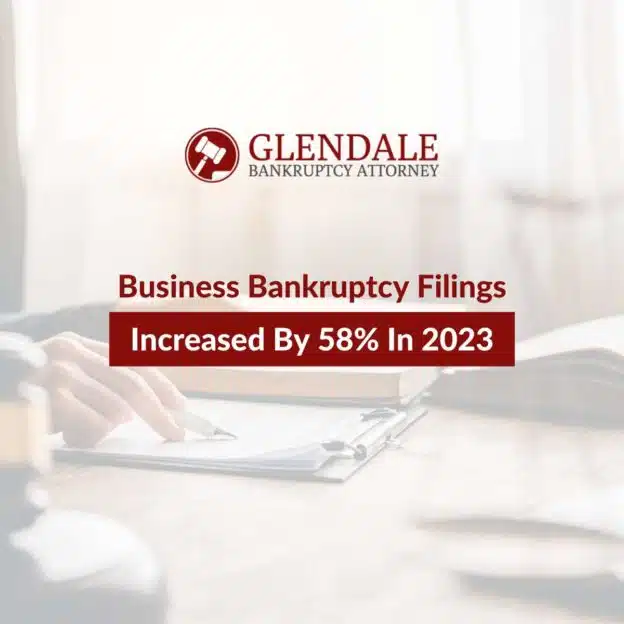The Data Is In: Business Bankruptcy Filings Increased By 58% In 2023
Over the past few years, it seems like it has gotten much more difficult just to get by. People are finding creative ways to dodge the effects of inflation, but many companies don’t have the flexibility to make changes so rapidly. In addition to inflation, businesses face problems like increased shoplifting, staffing shortages, incongruity with post-pandemic lifestyles, and more. For some business models, the only option is to shut down and find a new line of work. Others can use bankruptcy to defend against creditors while deciding upon a new and more profitable business strategy. And now that 2024 is here, we have a clear view of what happened in 2023. There was a dramatic increase in bankruptcy filings in 2023, particularly by corporations. Continue reading if you’re interested in learning more about what caused this increase in the business bankruptcy rate. For your free phone consultation with an experienced Arizona bankruptcy lawyer, call 623-640-4945.

What Caused Business Bankruptcies to Increase in 2023?
There were 179 corporate bankruptcy filings in the United States in 2022, but this number increased to 282 for 2023. Health care companies were the hardest hit, increasing by 117% and representing 21% of business bankruptcy cases in general. For example, Envision Healthcare filed for bankruptcy with $9.4 billion in debt, and radiology provider Akumin filed for bankruptcy with $1.3 billion in debt. Issues within the health care industry include declining numbers of patients, staffing shortages with demand for higher wages, and inadequate reimbursement rates for Medicare and Medicaid patients.
Another industry that saw increased bankruptcy rates was real estate. This may come as a surprise, considering the staggering increase in home prices in recent years both in Arizona and nationwide. Real estate companies represented 11% of corporate bankruptcy cases for 2023. The Chinese real estate company Evergrande filed a Chapter 15 bankruptcy, stating to have $38.86 billion in debt. WeWork, an office-sharing space company, also declared bankruptcy in 2023 with an estimated $47 billion in debt. Other notable business bankruptcy cases from 2023 include radio giant Audacy, pharmacy chain Rite Aid, and Silicon Valley Bank.
Chapter 11 Bankruptcy for Corporations
Most of the businesses that declared bankruptcy in 2023 did so using Chapter 11 bankruptcy. While it is not the most popular form of bankruptcy when you factor in consumer bankruptcy filings for individuals, it is often used by corporations because it doesn’t require a company to liquidate. A business that declares Chapter 11 bankruptcy can continue operating. Its normal daily functions will remain in the control of ordinary management. However, major decisions will need to pass through the creditor committee. The creditor committee is a feature of Chapter 11 bankruptcy in which the debtor’s primary debtholders form a committee that can give input and vote for or against proposals throughout the case. Small businesses can skip the creditor committee process through a small business filing or a subchapter V filing. A creditor committee isn’t required under either of these types of Chapter 11 bankruptcy, but the debtor must have less than $7.5 million in debt to qualify.
What is Chapter 15 Bankruptcy?
As mentioned above, Evergrande’s bankruptcy was a Chapter 15 case. Chapter 15 is a relatively new type of bankruptcy case, as it was created in 2005. One major reason that other companies may have not used Chapter 15 is that it is meant for companies based in multiple countries. Often, the company will have already filed a bankruptcy (or a similar legal action) in their home country before bringing a Chapter 15 bankruptcy case in the United States. Without the prior case in their home country, it can be simpler to file Chapter 7 bankruptcy or Chapter 11 bankruptcy instead.
In a Chapter 15 bankruptcy case, the company should assign a foreign representative. The foreign representative should file a petition for recognition of a foreign proceeding, which is basically an acknowledgment that the company is involved in a bankruptcy case in another country. What happens next will depend on if the company’s foreign bankruptcy proceeding is considered a foreign main proceeding or a foreign non-main proceeding. It is considered a main proceeding if the case is occurring in the country in which the corporation has its “center of main interests.” The foreign representative has the authority to run the business while the bankruptcy is proceeding like a creditor committee in a Chapter 11 bankruptcy case.
Consumer Bankruptcy: Chapter 7 and Chapter 13
Chapter 7 bankruptcy can also be used by businesses, but most individuals will file their consumer bankruptcy petitions under either Chapter 7 or Chapter 13. Chapter 7 bankruptcy is the more commonly-filed Chapter of the two. A corporation that files for Chapter 7 bankruptcy must shut down, and doesn’t have the option to continue operating like in Chapter 11 bankruptcy. Chapter 13 bankruptcy is not an option for most corporations.
Chapter 7 bankruptcy is the most popular Chapter of bankruptcy for good reason. It offers effective debt relief, clearing debts like medical bills, credit cards, and taxes that meet certain requirements. This is generally the simplest and fastest form of bankruptcy, with most cases being completed in about 3-5 months. That doesn’t mean that there are no hurdles to filing a Chapter 7 bankruptcy petition. A debtor must meet certain income requirements, which vary from state to state, to qualify for Chapter 7 bankruptcy. While not technically a requirement, a Chapter 7 bankruptcy debtor should also confirm that their assets will be protected by exemptions in a Chapter 7 bankruptcy filing. Again, bankruptcy exemptions vary from state to state. If you have questions or concerns about qualifying for Chapter 7 bankruptcy in Arizona, Arizona bankruptcy lawyer, call 623-640-4945 for your free phone consultation with our firm.
Chapter 13 bankruptcy is sometimes a backup option for Chapter 7 bankruptcy, and sometimes is the preferred choice because of its unique features and benefits. Chapter 13 bankruptcy pays off debts. It reorganizes them into a payment plan of 3 or 5 years. This provides the opportunity to become current on and pay off secured debts such as a house or car. However, a Chapter 13 bankruptcy case needs to be planned carefully- it should take up all of the debtor’s disposable monthly income for however long the payment plan lasts. For more information on your potential chapter 13 bankruptcy case in Phoenix or Tucson, Arizona, call 623-640-4945 for your free consultation with our firm.
When Times Get Tough, Bankruptcy Might Be Able To Help
Filing for bankruptcy- and even the process of reaching out to bankruptcy lawyers- can be stressful, burdensome, and even embarrassing. But the recent increase in bankruptcy filings just goes to show that many are struggling with their financial situations currently, and that bankruptcy can assist when debts are too much to bear. Bankruptcy can stop your creditors in your tracks and clear your slate so that you can work on creating a new credit history. Our team at Glendale Bankruptcy Attorney aims to make the process easier along every step, including the payment process. Eligible clients can file for bankruptcy with our firm for as little as zero dollars down. To learn more, contact us through our online form or call us at 623-640-4945 to set up your free consultation with our Phoenix and Tucson bankruptcy lawyers.

GLENDALE BANKRUPTCY ATTORNEY
20325 N 51st Ave #134,
Glendale, AZ 85308
Office: 623-640-4945
Email: info@glendalebankruptcyattorney.co
Website: www.glendalebankruptcyattorney.co


